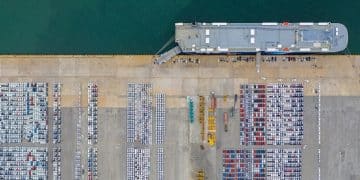Trade War US vs China 2025: Potential Consequences

What are the Potential Consequences of a Trade War Between the US and China in 2025? A full-blown trade war between the US and China in 2025 could trigger a global recession, disrupt supply chains, inflate prices for consumers, and reshape geopolitical alliances, impacting businesses and economies worldwide.
The possibility of a trade war between the US and China in 2025 looms large on the horizon, sparking widespread concern among economists, policymakers, and businesses alike. Understanding the potential ramifications of such a conflict is crucial for navigating the increasingly complex global landscape.
Understanding the Foundations of a Potential Trade War
To fully grasp the potential consequences, it’s essential to understand the underlying tensions that could trigger a trade war between the US and China in 2025. These tensions stem from a complex web of economic, political, and strategic factors.
Historical Trade Disputes
Trade disputes between the US and China are not new. They have a history of disagreements over issues like intellectual property theft, currency manipulation, and trade imbalances. A brief look at the past can illuminate the current situation.
- Past disputes have involved tariffs on goods like steel, aluminum, and agricultural products.
- Negotiations have often led to temporary resolutions, but underlying tensions remain.
- These disputes highlight the ongoing struggle for economic dominance between the two nations.
Key Points of Contention
Several key areas of contention are at the heart of the potential trade war in 2025. These include technology, market access, and geopolitical influence. Recognizing these points will help anticipate future developments.

- The US accuses China of unfair trade practices, including intellectual property theft and state-sponsored cyber espionage.
- China criticizes the US for restricting access to its markets and imposing unfair tariffs.
- Both countries are vying for dominance in key technology sectors, such as artificial intelligence and 5G.
Understanding these foundations is critical for assessing the potential consequences of a trade war between the US and China in 2025. These factors will shape the nature and intensity of any future trade conflict.
Economic Consequences for the United States
A trade war would have significant economic consequences for the United States. These impacts would be felt across various sectors, from manufacturing and agriculture to consumer goods and technology.
Impact on Key Industries
Several key US industries would be particularly vulnerable in a trade war. Manufacturers that rely on Chinese inputs for production, for example, could face increased costs and supply chain disruptions.
- Agriculture: American farmers could face reduced demand for their products, as China could impose tariffs on imports of soybeans, corn, and other agricultural goods.
- Manufacturing: US manufacturers that rely on Chinese imports for components and raw materials could see their costs increase.
- Technology: American technology companies could face restricted access to the Chinese market, hindering their growth and competitiveness.
Consumer Price Increases
Consumers could also feel the pinch of a trade war through higher prices for goods and services. Tariffs on imported goods would likely be passed on to consumers, leading to inflation.
The potential consequences of a trade war between the US and China in 2025 could extend to reduced consumer spending, impacting overall economic growth.
Job Losses and Economic Slowdown
An escalating trade war could lead to job losses in the US, particularly in industries that rely heavily on trade with China. Reduced exports and increased costs could force companies to lay off workers or slow down their hiring plans.
The impact on jobs and business investment could ultimately contribute to an economic slowdown in the US.
The economic consequences for the United States from a trade war between the US and China in 2025 would be substantial and far-reaching, affecting industries, consumers, and workers alike.
Economic Consequences for China
China would also face significant economic consequences in a trade war with the US. Its export-oriented economy is highly dependent on access to the US market.
Decline in Exports
The most immediate impact on China would likely be a decline in exports to the US. Tariffs on Chinese goods would make them more expensive and less competitive in the American market.
- Reduced export revenues would negatively affect China’s economic growth.
- Factories in China could face reduced orders, leading to layoffs.
- The impact would be particularly severe in industries that rely heavily on exports to the US, such as electronics, textiles, and machinery.
Impact on Manufacturing Sector
The manufacturing sector is a cornerstone of the Chinese economy. A trade war could severely disrupt this sector. Decreased demand for Chinese goods would force factories to scale back production.
The potential consequences of a trade war between the US and China in 2025 include factory closures, job losses, and reduced investment.

Slower Economic Growth
A decline in exports and a weakened manufacturing sector would inevitably lead to slower economic growth in China.
The potential consequences of a trade war between the US and China in 2025 is that the Chinese government may struggle to meet its economic targets, potentially leading to social and political instability.
The economic consequences for China from a trade war would be significant, affecting its export sector, manufacturing industries, and overall economic growth.
Global Economic Implications
A trade war between the US and China would not be limited to just those two nations. It would have far-reaching implications for the global economy, affecting trade flows, supply chains, and investment patterns worldwide.
Disruption of Global Supply Chains
Global supply chains are highly interconnected, with many companies relying on inputs from multiple countries. A trade war could disrupt these supply chains, leading to higher costs and production delays.
Businesses that rely on goods from China but are located outside of US may be affected.
- Companies may need to find alternative suppliers, which could be more expensive or less efficient.
- The impact of a trade war between the US and China in 2025 are price increases for consumers and companies.
Impact on Emerging Markets
Emerging markets could also be negatively affected by a trade war. Reduced global trade could lead to slower economic growth. A decrease in foreign investment can lead to instability.
Many developing countries rely on exports to the US and China, and a trade war would reduce demand for their products.
The impact on economies is widespread and can leave many countries struggling.
Geopolitical Repercussions
Beyond the economic impacts, a trade war between the US and China in 2025 could have significant geopolitical repercussions, reshaping alliances and power dynamics on the world stage.
Understanding that the world is a community is important, and working together is imperative.
The global economic implications of a trade war between the US and China would be substantial and far-reaching, affecting trade flows, supply chains, investment patterns, and geopolitical relationships.
Potential Winners and Losers
While a trade war would likely result in overall economic losses, some countries and industries could potentially benefit from the fallout. Understanding these potential winners and losers is important for assessing the full impact of a trade war.
Countries That Could Benefit
Some countries could benefit from a trade war by filling the void left by reduced trade between the US and China. These countries could see increased exports and foreign investment.
- Vietnam, Mexico, and other countries with lower labor costs could attract manufacturers looking to relocate from China.
- Countries with strong relationships with both the US and China could serve as intermediaries in trade, benefiting from increased trade flows.
Industries That Could Benefit
Certain industries could also benefit from a trade war. Domestic industries that compete with imports from China could see increased demand for their products.
There are many areas that can be examined, and the benefits can be seen in many ways.
Understanding these potential winners and losers provides insight into the complex and multifaceted impact of a trade war.
Strategies for Businesses to Mitigate Risks
Given the potential for a trade war, businesses need to develop strategies to mitigate the risks. Diversifying supply chains, exploring new markets, and investing in innovation are some of the steps companies can take.
Diversifying Supply Chains
One of the most effective ways to mitigate the risks of a trade war is to diversify supply chains. This means sourcing inputs from multiple countries rather than relying on a single supplier.
Many steps can be taken to mitigate the problems, if planning begins now.
Businesses that have diversified supply chains would be better positioned to weather the storm.
Exploring New Markets
Another strategy is to explore new markets for exports. Companies that are overly reliant on the US or Chinese market should consider expanding their operations into other regions.
By expanding into new markets reduces dependence on any one nation.
Investing in Innovation
Investing in innovation can also help companies to be more competitive and resilient in the face of a trade war. Developing new products and technologies can help companies to differentiate themselves from competitors.
Businesses that prioritize innovation are more likely to thrive in a challenging economic environment.
| Key Point | Brief Description |
|---|---|
| 📉 Economic Slowdown | Reduced trade volumes can lead to slower global economic growth. |
| 🔗 Supply Chain Disruption | Global supply chains could be significantly affected, raising costs. |
| 💰 Increased Tariffs | Consumers may face higher prices due to tariffs imposed on goods. |
| 🌍 Geopolitical Shifts | Trade tensions could lead to realignments and shifts in global influence. |
Frequently Asked Questions
▼
A trade war is an economic conflict where countries impose tariffs or other trade barriers on each other in retaliation for perceived unfair trade practices. It can lead to reduced trade and economic growth.
▼
The average US consumer might see higher prices on imported goods as tariffs are passed down. This could impact household budgets and spending habits, affecting lifestyle costs.
▼
In China, export-oriented sectors such as electronics, textiles, and machinery would likely be most affected due to decreased demand from the US, leading to potential factory closures.
▼
Some countries with lower labor costs or strategic trade positions might benefit by filling the trade void created by the conflict, attracting manufacturers, and increasing their exports.
▼
Businesses can diversify supply chains, explore new markets outside the US and China, and invest in innovation to stay competitive and resilient during the economic upheaval caused by trade wars.
Conclusion
In conclusion, the potential consequences of a trade war between the US and China in 2025 are serious and far-reaching. From economic disruptions and increased consumer costs to geopolitical shifts, the impacts would be felt worldwide. It is crucial for businesses and policymakers to prepare for these risks and work towards finding cooperative solutions to trade disputes.





